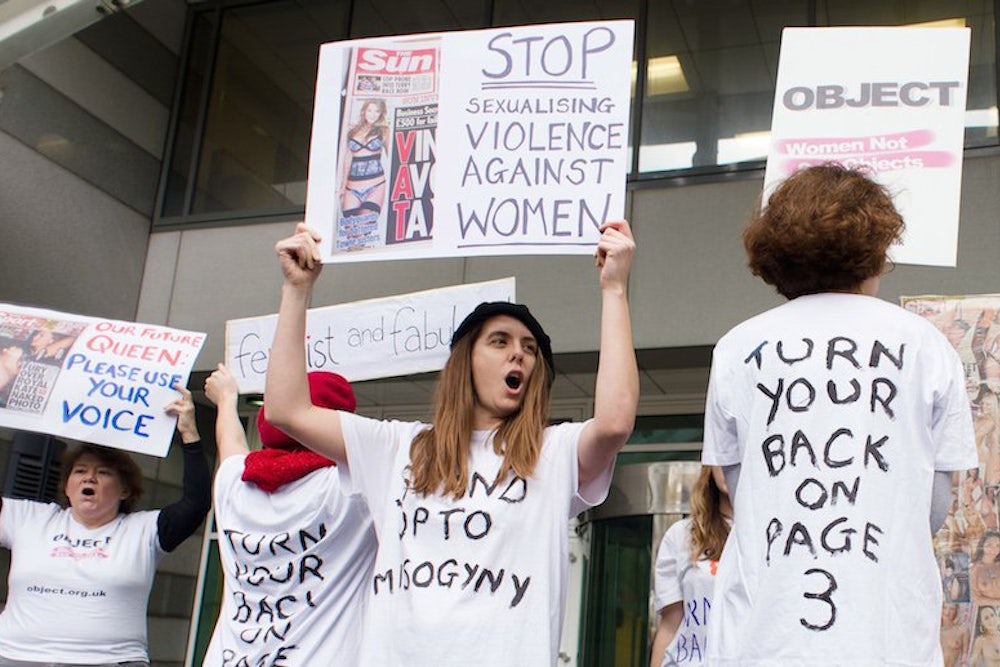It looked like a triumph of Internet activism: legions of nobodies tweeting at a powerful man until he acceded to their demands. Last week, newspapers around the world gleefully announced that the Rupert Murdoch-owned tabloid The Sun—one of Britain’s biggest and nastiest papers—had caved to pressure from a grassroots campaign, and agreed to stop printing photos of topless women on the paper’s Page Three.
But it turned out to be nothing more than a bait-and-switch—and perhaps a sign of a larger problem with feminism in the twenty-first century.
The day after international media reported that the glamour models would from then on wear bras or bikinis, The Sun tweeted a photo of a braless blonde and gloated: “Further to recent reports in all other media outlets, we would like to clarify that this is Page 3 and this is a picture of Nicole, 22, from Bournemouth.” On Saturday, Murdoch took to Twitter himself to condemn the “horrible elites” who “yak on about Page 3” and to reassure his followers, “The Sun will always have great looking women—and men!” (Though the latter will be clothed, since the “Page 7 Fella” debuted in the 1980s never caught on.)
Much fuss and publicity in UK as horrible elites yak on about Page 3. Worry not, The Sun will always have great looking women - and men!
—
rupertmurdoch
Page Three has always been controversial. Its introduction in 1970 was met with anti-pornography protests; some libraries refused to carry the paper at all. In the 1980s, Labour Members of Parliament gained some—but ultimately not enough—support for a bill that would ban it. In 2012, 61 percent of women and 86 percent of Guardian readers believed it should be abolished.
Nevertheless, it stuck around. It’s credited with helping boost The Sun’s circulation, which doubled within a year of the new feature’s debut. A handful of successful models and actresses, including Samantha Fox and Katie Price (aka “Jordan”), got their start posing for Page Three, often when they were still in their teens; it was only in 2003 that the models’ minimum legal age was raised from 16 to 18. Two-thirds of The Sun’s readers like Page Three and don’t see a problem with it.
Over the past couple years, however, many believed that change was finally in the offing. In 2012, British actress Lucy-Anne Holmes wrote to The Sun’s editor, Dominic Mohan, expressing her dismay that, even during the Olympics, The Sun was paying more attention to a teenager in her underwear than genuine stars like British track phenom Jessica Ennis. When she didn’t hear back, she decided to publish her letter on Change.org; her petition ballooned into a movement. The “No More Page 3” campaign has been endorsed by over 140 MPs, the National Union of Teachers, The British Youth Council, and many other national and feminist organizations. The NoMorePage3 Twitter feed has 40,000 followers and over 200,000 people have signed Holmes’s petition. It has even inspired a similar movement in Germany, where feminist activists are mobilizing in protest of the top German tabloid’s publication of a topless “Bild-Girl.”
Meanwhile, Murdoch has been teasing his feminist opponents, giving them false hope by calling Page Three “old-fashioned” and even offering that his critics—the Page 3 campaign in particular—“may be right, don't know but considering.” Murdoch offers crumbs and false hope; then, on a whim, he wipes away the efforts of thousands of well-meaning volunteers. Holmes told The Guardian she experienced burnout after regularly putting in 18-hour stints on Twitter.
What this battle has mostly missed is that Page Three is a product—not a cause—of a sexist society. As Alyssa Rosenberg wrote in Slate, “Stopping publication of that feature won't get rid of the market for images of topless, compliant women.” Jessica Grose put it another way: “This could have been replaced with Maxim or Playboy or the cover of Paper magazine or Sports Illustrated's swimsuit issue, or ESPN's BODY issue.” Even if The Sun abolished Page Three, teenage boys would still be able to pick up any number of “Lads’ Mags” at the supermarket—unless, of course, the “Lose the Lads’ Mags” campaign succeeds.
Picking at Murdoch and his empire doesn’t seem like the best expenditure of feminist energy. It’s unfortunate that Murdoch is one of the most powerful people in media, but that status doesn’t automatically render him a worthy adversary. As he shows time and time again—like when he tweeted in the wake of Charlie Hebdo that ordinary Muslims should be “held responsible” for violent extremism—he has no qualms about airing his repulsive opinions. Page Three is sexist, yes—but Murdoch and The Sun just aren’t worthwhile targets.
